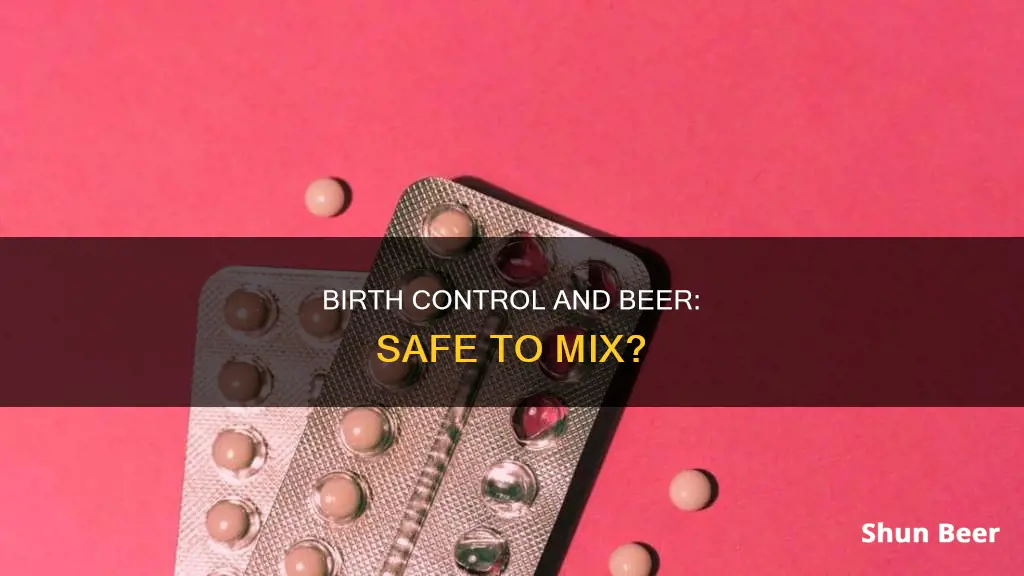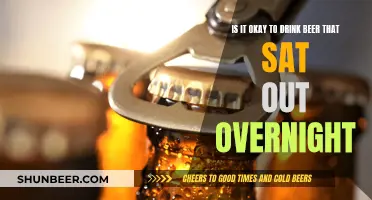
Drinking alcohol while on medication can be dangerous and even deadly. Alcohol can interact with certain drugs, exacerbating the medical and mental health conditions the medication is intended to treat. It can also make some medications less effective by interfering with how they are absorbed in the body. In some cases, alcohol increases the bioavailability of a drug, which can raise the concentration of the medication in the blood to toxic levels. It is important to consult a doctor or pharmacist about whether it is safe to drink alcohol while on medication.
One type of medication that people may wonder about in this regard is the morning-after pill. There is no known interaction between the morning-after pill and alcohol, and there is no evidence that drinking alcohol after taking it would make it any less effective. However, if you drink until you feel sick, you could throw up the pill before your body absorbs it.
| Characteristics | Values |
|---|---|
| Can you drink beer after taking the 1-day pill? | Yes, there is no known interaction between the 1-day pill and alcohol, and drinking alcohol does not make the pill less effective. |
| Potential side effects | You may feel more intoxicated than usual and have a slightly higher blood alcohol level. There may also be side effects from the pill, such as irregular bleeding, nausea, and vomiting. |
| Recommendations | It is recommended to drink in moderation. If you drink until you feel sick, you could throw up the pill before your body absorbs it. |
What You'll Learn

Alcohol does not make the morning-after pill less effective
It is a common misconception that alcohol affects the effectiveness of the morning-after pill. However, this is not true. Drinking alcohol before or after taking the morning-after pill will not make it less effective. The most common emergency contraceptive pills, Plan B and Ella, are not impacted by alcohol consumption.
It is worth noting that while alcohol does not affect the effectiveness of the pill, it can increase the risk of needing to use the morning-after pill in the first place. Alcohol can impair judgment and increase the likelihood of unprotected sex, which is a common reason why women turn to emergency contraception.
Additionally, it is important to drink in moderation after taking the morning-after pill. Excessive drinking may lead to vomiting, which could cause you to throw up the pill before your body has a chance to absorb it.
While the morning-after pill does not impact your alcohol intake, it may cause side effects such as irregular bleeding or spotting and nausea, sometimes leading to vomiting. These side effects are separate from any potential effects of alcohol.
In conclusion, alcohol does not make the morning-after pill less effective. However, it is always advisable to drink in moderation and be aware of the potential side effects of the morning-after pill, regardless of alcohol consumption.
Beer and Thyroid Lobectomy: What You Need to Know
You may want to see also

Interactions between the morning-after pill and alcohol are minor
It is generally considered safe to consume alcohol after taking the morning-after pill. Drinking will not affect the pill's effectiveness, and there are no reported interactions between alcohol and Ella, one of the most common emergency contraceptive pills.
That being said, there is a minor interaction between alcohol and Plan B, another common morning-after pill. You may feel more intoxicated than usual and have a slightly higher blood alcohol level if you drink after taking Plan B, although there is not enough data to confirm this.
If you are drinking after taking the morning-after pill, it is recommended to drink in moderation. If you drink to the point of feeling sick, you may vomit the pill before your body has a chance to absorb it. Additionally, alcohol can increase your risk of needing emergency contraception in the first place, as it can lead to unprotected sex.
While the morning-after pill does not affect alcohol's effectiveness, it may cause side effects such as irregular bleeding and nausea, sometimes leading to vomiting.
Do Sulfite Wands Really Work for Beer?
You may want to see also

Drinking after taking the morning-after pill should be done in moderation
Drinking after taking the morning-after pill is generally considered safe, as alcohol does not affect the pill's effectiveness. However, it is still recommended to drink in moderation.
The morning-after pill, such as Plan B or ellaOne®, is a form of emergency contraception that can be taken to prevent unplanned pregnancy after unprotected sex or contraceptive failure. While alcohol does not reduce the pill's effectiveness, there are a few reasons why moderation is advised.
Firstly, drinking alcohol after taking the morning-after pill may increase your blood alcohol level, making you feel more intoxicated than usual. This can impair your judgment and coordination, and lead to dangerous situations. Additionally, if you drink excessively and vomit, you may throw up the pill before it has been fully absorbed by your body, reducing its effectiveness.
Secondly, alcohol can interact with certain medications, including antibiotics, painkillers, and mental health medications. These interactions can range from increased drowsiness and dizziness to more severe side effects like liver damage and breathing difficulties. Therefore, if you are taking any other medications in addition to the morning-after pill, it is crucial to consult a doctor or pharmacist to understand the potential risks of mixing alcohol with your specific combination of drugs.
Lastly, while the morning-after pill is effective in preventing unplanned pregnancy, it does not protect against sexually transmitted infections (STIs). Drinking alcohol may impair your judgment and increase the likelihood of engaging in risky sexual behaviour, potentially exposing you to STIs.
In conclusion, while it is generally safe to drink alcohol after taking the morning-after pill, it is important to do so in moderation. This ensures that you avoid potential negative side effects, maintain the effectiveness of the pill, and protect your overall health and well-being.
Beer After Dinner: A Healthy Choice?
You may want to see also

Alcohol can interact with certain drugs
- Allergy, Cold, and Flu Medicines: Antihistamines can cause excessive drowsiness and increase the risk of accidents and overdose. When combined with alcohol, the risk of adverse effects is even higher.
- Antibiotics and Antifungals: Alcohol can worsen the side effects of certain antibiotics and antifungals, leading to symptoms such as a fast heartbeat, sudden changes in blood pressure, stomach pain, nausea, vomiting, headache, or redness in the face. Mixing alcohol with certain antibiotics like isoniazid and ketoconazole can also cause liver damage.
- Antidepressants: Alcohol can intensify the side effects of antidepressants, including drowsiness, dizziness, and impaired motor control. It can also increase feelings of depression or hopelessness and raise the risk of falls and car accidents. Additionally, mixing alcohol with monoamine oxidase inhibitors (MAOIs) can lead to serious heart problems and dangerously high blood pressure due to the presence of tyramine in beer and wine.
- Anxiety and Epilepsy Meds: Mixing alcohol with certain anxiety and epilepsy medications can result in drowsiness, dizziness, slowed or laboured breathing, impaired motor function, behavioural changes, memory problems, and an increased risk of overdose.
- Arthritis Medicines: When combined with alcohol, certain arthritis medications can increase the risk of ulcers, stomach bleeding, and liver damage.
- Attention and Concentration Drugs: Alcohol can interact with medications for attention and concentration disorders, causing dizziness and sleepiness. Certain combinations can also increase the risk of heart problems and liver damage.
- Blood Pressure Medications: Mixing alcohol with blood pressure medications can lead to dizziness, fainting, drowsiness, and heart problems such as irregular heartbeats (arrhythmia).
- Blood Thinners: Alcohol consumption increases the risk of falling or getting injured, which is dangerous when taking blood thinners as it can lead to internal bleeding. Additionally, alcohol can interfere with the metabolism of warfarin, a common blood thinner, leading to either increased or decreased effectiveness.
- Cholesterol-Lowering Meds: Drinking large amounts of alcohol while taking cholesterol-lowering medications may increase the risk of liver damage.
- Diabetes Medications: Alcohol and diabetes medications can cause a person's blood sugar to drop too low, resulting in nausea, vomiting, headache, rapid heartbeat, and sudden changes in blood pressure.
- Pain Medications: Mixing alcohol with pain medications can lead to stomach upset, bleeding, ulcers, rapid heartbeat, and liver damage.
- Sleeping Pills: Combining alcohol with sleeping pills can result in drowsiness, dizziness, slowed breathing, impaired motor control, unusual behaviour, and memory problems. This combination can be dangerous and even deadly.
Beer After Work: Relax, Unwind, and Socialize
You may want to see also

Consult a doctor or pharmacist about drinking on medication
It is important to consult a doctor or pharmacist about drinking on medication. They are qualified to advise on the potential risks of combining alcohol with medication and can provide guidance tailored to your specific circumstances.
Doctors and pharmacists are knowledgeable about drug interactions and can explain how alcohol may affect the absorption and metabolism of your medication, as well as its effectiveness. They can also inform you of any potential side effects, such as drowsiness, dizziness, impaired judgment, or more severe consequences like liver damage. By consulting a medical professional, you can make an informed decision about alcohol consumption while taking medication, ensuring your safety and well-being.
Additionally, they can provide specific instructions on timing. In some cases, it may be safe to drink alcohol a few hours after taking medication, while other situations may require a longer waiting period, such as a few days or more. This timing is crucial to minimising harmful effects.
When consulting a doctor or pharmacist, be sure to provide them with a comprehensive list of all the medications you are currently taking, including prescription drugs, over-the-counter medications, vitamins, and supplements. This information will enable them to accurately assess any potential risks associated with alcohol consumption.
It is also important to be aware of your individual health factors, such as age, sex, metabolism, and alcohol tolerance, as these can influence the effects of alcohol on your body when interacting with medication.
The Magic of Beer Randall: Infusing Beers with Flavors
You may want to see also
Frequently asked questions
There is no known interaction between the 1-day pill and alcohol, and there is no evidence that drinking alcohol after taking the pill would make it any less effective. However, it is always best to consult a doctor or pharmacist for personalized advice.
Some women report experiencing irregular bleeding, nausea, and sometimes vomiting after taking the 1-day pill.
There is no specific timeframe, but it is generally recommended to wait until the pill has been absorbed by the body to avoid vomiting.
Alcohol can interact with certain medications and lead to dangerous health consequences. It is important to consult a doctor or pharmacist to understand the potential risks and side effects.







